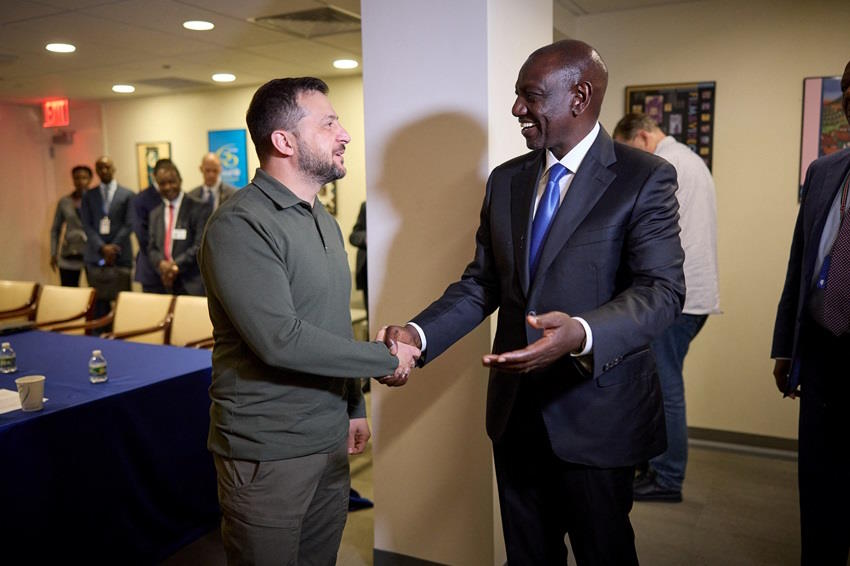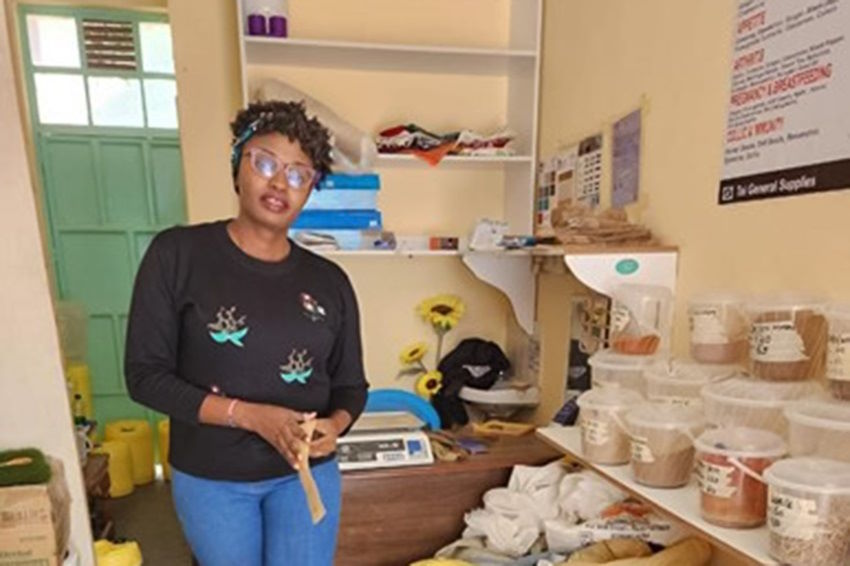Former President Farmaajo Warns Against Politicizing NCC Mogadishu, Somalia – May 7, 2025 — Former…

What an end to the war in Ukraine would mean for Kenya?
Published: Feb.2,2024 4:35 PM(EAT)
By Moses Muli
In Kenya there is concern over the impact of the war on Ukraine on global food security.
Early morning Dorothy Mwende, a 34-year-old mother of two, darts through the rain to open the doors to her grocery store.
Her small business is in Kitengela town, one of Nairobi’s satellite communities. She has to be up by 5am to replenish her stock if she is to attract any customers.
And prices have been going up. Take lentils. She says they now sell at $2.60 a kilo compared to just one dollar in March 2022.
Food inflation was high before Russia’s illegal invasion of Ukraine in February 2022. But over the past two years, it jumped from just over five per cent to close to eight per cent, according to the Kenya National Bureau of Statistics.
It all means that Dorothy is having to help her customers. Many collect stacks of kales, tins of rice, maize grains, as well as cowpeas on credit.
“Things are tough for everyone, but I have to be strong for my family,” she says.
Twice, Dorothy has fallen on hard times but she refuses to give up.
“I have rent to pay, school fees for my children and so many things,” she adds.
Dorothy is banking on the cost of living coming down. Part of the solution to that is an end to Russia’s invasion of Ukraine thousands of kilometers away in Europe.

Dorothy Mwende in her grocery Store in Kitengela
Russia’s attack on Ukraine is a cause of increased prices of foodstuffs and restricted supply, not just in Kenya, but around the world. Ukraine is a major supplier of grain to world markets and Russia’s efforts to prevent Ukrainian exports have made a bad situation worse.
In October 2023 the Ukrainian government reported that Russia had destroyed 300,000 tons of grain since July in attacks on Ukraine’s ports.
In Kenya there is particular concern over the impact of the war on global food security. The Principal Secretary for Foreign Affairs Korir Sing’oei, described Russia’s efforts to disrupt the supply of grain by withdrawing from the Black Sea Grain Initiative last summer as a “stab on the back” for those in drought hit countries.
Food is “a weapon of war for Russia”
Rashid Abdi, a Chief Analyst, Horn of Africa and Middle East at Sahan Research, a Nairobi- based think tank on security and geopolitics believes Russia is using grain shipment constraints as leverage against Ukraine.
“There is a very brutal calculation at play on the grain issue,” he says.
“Food has become a weapon of war for Russia.”
United Nation monitors reported in late 2023 that Russia’s war on Ukraine had claimed the lives of more than 10,000 civilians, including more than 560 children. More than 18.5 thousand have been injured. Critical infrastructure including schools, hospitals and power plants have been destroyed or badly damaged.
Rashid Abdi adds, “We have seen Russia’s aggression become a war of annihilation. International humanitarian law is not being observed at all. Critical infrastructure like ports are being damaged, cities bombed. It is the kind of warfare that basically destroys nations.”
Russia’s war on Ukraine is not the only threat to Kenya’s food security. Kenya and the countries surrounding it in the Horn of Africa were already facing extreme challenges. Economic fallout from extreme climate events like drought and the ongoing El Nino phenomena have hit growth prospects. The World Food Programme says three years of drought – the longest on record in the region – have left 4.4 million Kenyans facing crisis levels of hunger. Almost 1.5 million young children and women are acutely malnourished and nearly 3 million livestock have perished. It will take years for the land – and its farmers – to recover.
The United Nations World Food Programme is now providing aid to hundreds of thousands of people. They were being helped by Ukraine, which set up the Grain from Ukraine programme to combat malnutrition and hunger in Africa and Asia. Last March, 25,000 tons of Ukrainian wheat were sent to Kenya via this scheme to feed those in refugee camps.
Russia’s attacks on Ukrainian ports and shipping continue to be a threat, although Ukraine has now successfully established a “maritime corridor” in the Black Sea, allowing it to export its agricultural produce by sea again. Since the corridor became operational, 300 ships have exported more than seven million metric tons of grain, as of December 2023, a very welcome development.
The Ukrainian President Volodymyr Zelenskyy and Kenya’s President William Ruto are now creating grain hubs in Mombasa, with Ukraine aiming to replicate the same across Africa.
And Ruto wants more. He says, “Kenya advocates for a peaceful resolution of the Russia-Ukraine conflict to restore stability, alleviate the suffering of the people and stop the destruction of property.”
Nazanine Moshiri, a Senior Analyst in Climate, Environment & Conflict at the International Crisis Group, says, “Clearly the Ukraine crisis has had a big impact. It is a major supplier of grain to Africa, which also impacts Kenya.”
“The fact that there is vulnerability from both local and international supply chains also adds to those pressures (of drought and hunger).”
Kenya is East Africa’s largest economy and it has demonstrated its commitment to restore peace in Ukraine. Kenya voted for the UN General Assembly Resolution in February 2023 calling for Russia’s withdrawal from Ukraine. It supports the principles of the UN Charter – principally the protection of territorial integrity and sovereignty. At the onset of Russia’s full scale military invasion of Ukraine Nairobi’s envoy to the United Nations, Ambassador Martin Kimani, voiced Kenya’s rejection of Moscow’s efforts to chip away at Ukraine’s borders.
He said, “Kenya registers its strong concern and opposition to the recognition of Donetsk and Luhansk as independent states. We further strongly condemn the trend in the last few decades of powerful states, including members of this Security Council, breaching international law with little regard.”
Presidents Ruto and Zelenskyy met at the United Nations General Assembly in New York last September. Mr Ruto said he believed the resolution of the conflict was a priority for the world and essential to advancing the shared prosperity. Later, in December, he cited the war in Ukraine as a major influence on Kenya’s high cost of living.
President Zelenskyy has presented a 10-point plan to restore peace – which includes ensuring Ukraine’s grain exports to the world’s poorest nations and the restoration of Ukraine’s borders. Russia withdrawing from Ukraine entirely – militarily and politically – would be good not only for Ukraine, but the whole world – including Kenya, helping people like Dorothy and her customers.


This Post Has 0 Comments